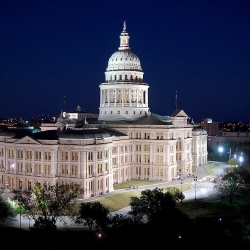
Texans love to gamble. 8-Liners make an estimated $2 billion annually and they are considered a minor industry.
The Fort Worth Star Telegram reports that the Texas State Legislature might consider legalizing fantasy sports in 2017. That suggestions came in a report which stated casino gambling, gaming machines at horse tracks, or 8-Liner machines in storefronts are less likely than in past years.
Mark Jones, a political science professor at Rice University, said the push by the gaming industry is not as strong as it was in years past. The lack of lobbying comes at a time the Texas Treasury needs an influx of cash.
Mark Jones on Fantasy SPorts
Professor Jones said, “Most recent legislative sessions have seen an at least halfhearted attempt by the gambling industry to pass legislation that would allow for some form of casino gambling in Texas. This session has been different, in that the gambling industry has by and large appeared to have given up any hope of trying to pass legislation that would open up Texas to casino gambling.”
The Houston-based polisci professor did not offer reasons for the lack of interest in passing new laws. The year after a presidential election sometimes causes political action groups to reallocate funds, to better accommodate the new political realities. Many lobbyists overspend in an election year, though industries must follow through to see the fruits of previous lobbying efforts.
Mark Jones said that the “lack of legislative effort is taking place within the context of a tight budget, when in the past legislators have been more open to discussing the legalization of gambling as a way to raise additional tax revenue in times of revenue scarcity.”
DFS Companies Support Bill
A bill which would legalize fantasy sports has support. FanDuel and DraftKings are coming through a merger, so they can consolidate efforts to lobby state governments for daily fantasy sports legislation.
Texas is a natural place to focus efforts, because of the large population of Texas and the lucrative nature of its fantasy sports demographic. Jones stated, “The only potential bright light for the gambling industry in general could be the passage of [this bill], which is a defensive effort by daily fantasy sports companies.”
Tom Landry on Texas Football
Besides the size of the DFS-playing community in Texas, fantasy sports is an issue likely to gain supports among Texans. Hall of Fame former Dallas Cowboys head coach Tom Landry said, “Football is to Texas what religion is to a priest.”
Texans are wild about football, at all three levels of competitive sports. They say high school football is king. More than one Texas Longhorns booster has, like Coach Landry, compared college football to religion in the state. And nothing gets passions going in the Lone Star State as much as Dallas Cowboys football.
Texans Love Gaming
Texans love fantasy football, too. Thus, a law aimed at legalizing, regulating, and taxing one-day fantasy football has a high chance of passing. While the State of Texas bans most forms of gambling, Texans love to gamble, too. Winstar Casino in Thackerville, Oklahoma and Choctaw Casino in Durant, Oklahoma are two of the largest casinos by gaming space in the United States. The vast majority of the gamblers who frequent those casinos are from the Dallas-Fort Worth metropolitan area, because those two casinos are an hour-and-fifteen-minutes from DFW.
The same can be said for the Shreveport-Bossier City area of Northwest Louisiana, which are about three miles from Dallas, or the casinos around Lake Charles, Louisiana (which are less than two hours from Houston). In short, Texans love sports and gaming, if only their lawmakers provided such things were legal.
Conservative Ethos in Texas Politics
One might wonder why the Texas legislature does not legalize more forms of gambling, then. Brandon Rottinghaus, a University of Houston political science professor, says that conservative politicians do not wish to be seen as allowing the spread of moral corruption. While Texans love to gamble, their political leaders do not love to be seen as supporting gambling.
Professor Rottinghaus said, “Conservatives are conflicted between finding new revenue sources for lean budget years and the moralistic ethos that fantasy sports are essentially gambling. Republicans tend to err on the side of being against what could be perceived as gambling for these moral reasons. Conservatives would have more trouble with their base in the next election than the value of the extra revenue from what may be labeled as gambling.”
Political legacies are more important than the gaming taxes which might be collected, so the legislature allows hundreds of millions of dollars a year leave the state. Daily fantasy sports has a chance, though, because state representatives like State Sen. Lois Kolkhorst (R-Brenham) and State Rep. Richard Raymond (D-Laredo) are willing to argue that it is a skill-based game. Around 90% of DFS winnings are collected by grinders, a type of professional daily fantasy sports player who uses advanced analytics and statistical analysis to gain an advantage over players going with their “gut”.
With that argument, lawmakers might be convinced that they are not really backing a gambling bill, but instead backing a test of a person’s football knowledge. That is the suggestion, at least, that DraftKings and FanDuel hopes to sell to the legislature.
